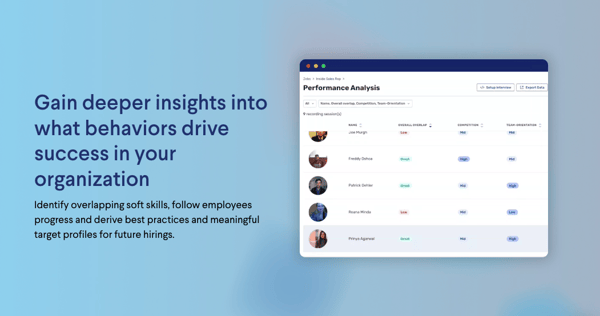In a post-pandemic world where social and emotional skills are high in demand, it’s more important than ever for companies to address empathy and interpersonal skills in the workforce.
In fact, with 93% of employers wanting to see soft skills on resumes, it’s definitely in candidates' best interest to find out which soft skills they should polish first.
So what are examples of the top soft skills that drive success?
What are the soft skill examples that are the key to success in the post-pandemic working environment?

What’s in this post?
- Defining soft skills: What are some soft skill examples?
- Why are soft skills becoming so vital?
- The top soft skills examples
- How can AI help with developing soft skills?
Defining soft skills: What are some soft skill examples?
In general, soft skills are those traits and/or skills that we use to interact with other people. In the context of a workplace, these skills become extremely crucial, as this determines how well you’ll be able to work with your colleagues, and whether you can lead or manage a team effectively.
As these soft skills become increasingly important, employers are becoming more aware of looking out for these soft skill examples in potential candidates. In fact, according to the 2021 McKinsey Global Survey on re-skilling, the proportion of companies addressing empathy and interpersonal skills doubled in 2020.
Want to learn more about soft skills, and how they differ from hard skills?
Read our blog on "Hard Skills vs Soft Skills. What's the Difference?" here!
Why are soft skills becoming so vital: adding value in a world of automation
The world is seeing a huge skill shift.
This transformation is changing the way we work, how we interact and communicate, and how we run businesses as a whole.
Particularly with the pandemic abruptly changing the work environment as we once knew it, existing trends dramatically accelerated, particularly in the areas of remote work and automation.
In fact, the need for physical and manual labor is seeing a steep decline, as well as basic cognitive tasks. Instead, the demand for technological, social, and emotional skills is growing.
The bottom line is, that soft skills cannot yet be replaced by machines, and soft skills are only going to become more and more relevant as we continue to see growth in automation.
So what does this mean for the world of recruiting and training? Learning and development teams and HR managers are going to have to take measured and strategic approaches to find the right blend of soft skills in their teams.
The top soft skills examples
Soft skill example 1: Adaptability and flexibility
A soft skill example that has proven its importance during the pandemic is flexibility and adaptability. Although they were crucial in the past, the mass transition to remote work in March 2020 completely reconfigured the norm surrounding where to work. But it's not just the switch to home-office which changed the everyday construction of a work day as we knew it. The element of flexibility has stretched further than that, such as when the work can be done, and also how it can be done.
Despite the natural reaction to default to fear or familiar solutions, the changes in the workplace that have been happening, especially since the pandemic, have reminded us that building adaptability begins with dealing with the change positively.
Soft skill example 2: Critical thinking
In a world where we are overloaded with an abundance of information, it becomes increasingly crucial to be able to have an eye for analyzing information and balancing the facts - essentially looking at situations with a critical eye.
This soft skill example is pivotal for all employees, but becomes exceptionally important for top managers of companies, as this soft skill example isn't simply about assessing situations and giving objective feedback; it also, just as importantly, includes giving objective feedback on your own actions.
This includes evaluating yourself, understanding what your strengths and growth areas are, and being open to criticism.
Soft skill example 3: Integrity
In the words of American politician Alan K Simpson... "if you have integrity, nothing else matters. If you don't have integrity, nothing else matters.”
The soft skill example of integrity isn't simply about being honest - in fact, it is quite a bit deeper than that. To put it simply, it can be roughly translated as having the constitution to do the right thing, even when no one else is around.
Particularly in the 2022 hybrid workplace, where employees are given flexibility in a way like never before, integrity is the key to fostering a strong bond between employees and managers.
How can AI help with developing these soft skill examples?
So now we know what the most important soft skills are that employees are actively seeking, particularly in the post-pandemic workplace. But how can we improve these skills? Can they be trained? And if so, how?
Particularly as the need for remote training programs has been felt by companies globally over the last couple of years, artificial intelligence is creating new dimensions and redefining the concept of training employees - including soft skills.
As we’re seeing ongoing success in the machine learning scene, a lot of funding for AI research grants has been given, and spin-offs and start-ups are emerging at unprecedented rates.
Take Retorio's AI training program for example. Retorio's AI platform combines video analysis with role-plays of client simulations to offer interactive soft skill training for employees. Their clients, including one of Germany's biggest automotive manufacturers, use Retorio to scale up their training programs, as well as coach sales teams' soft skills remotely.

Want to see how you could use AI to your advantage?



